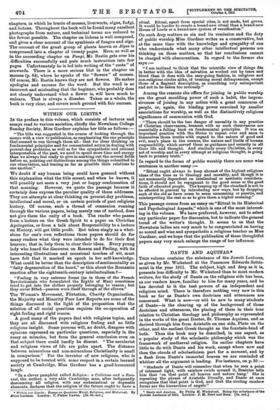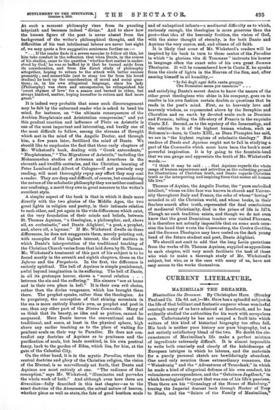DANTE AND AQUINAS.* THIS volume contains the substance of the
Jowett Lectures, as given by Mr. Wicksteed at the Passmore Edwards Settle- ment in the year 1911. The subject, high and deep as it is, presents less difficulty to Mr. Wicksteed than to most modern writers, for the study of Dante on the religious side has been, as our readers know, familiar to him for many years, and he has devoted to it the best powers of an independent and religious mind. There is therefore nothing very new in this book as far as Dante's own doctrines and utterances are concerned. What is new—or will be new to many'students of Dante—is the clearing up of the background of those doctrines and utterances, the placing of them in their true relation to Christian theology and philosophy as represented in the works of the great Doctor, St. Thomas Aquinas, and as derived through him from Aristotle on one side, Plato on the other, and the earliest Greek thought as the fountain-head of both. Thus the book may be described, in one aspect, as a popular study of the scholastic philosophy which was the framework of mediaeval religion. Its earlier chapters have little to do with Dante and his work, except where now and then the clouds of scholasticism part for a moment, and by a flash from Dante's immortal heaven we are reminded of whither all the argument is leading. For instance, on p.50 :— " Students of Dante will remember that when he sees a point of int,ensest light, with rainbow swirls around it Beatrice tells him that 'on that point all heaven and nature hang.' She is repeating the phrase of Aristotle literally, and Dante at once recognizes that that point is God, and that the circling rainbow forms are the hierarchies of angels."
• Dante and Aquinas. By Philip H. Wicksteed. Being the substance of the Jowett Lectures of 191L London : J. DI. Dent and Sons. [6s. net.]
At such a moment philosophy rises from its puzzling labyrinth and becomes indeed " divine." And to show how the human figure of the poet is never absent from the background of the writer's philosophical thought, and the difficulties of his vast intellectual labour are never lost sight of, we may quote a few suggestive sentences further on :—
If the reader finds it a severe exercise to follow all this, let him take comfort in the reflection that when Dante, in the course of his studies, came to the question whether first matter is under- stood by God,' he was so baffled by it that he turned aside from its consideration, and from the direct study of philosophy altogether, hoping to return to the attack with better success presently ; and meanwhile (not to stray too far from his loved studies) he took up the consideration of moral and social ques- tions; or, in his own allegorical language, since his lady (Philosophy) was stern and unresponsive, he relinquished his 'sweet rhymes of love' for a season and turned to other, but always kindred, matter, hoping hereafter to return and find more grace."
It is indeed very probable that some such discouragement may he felt by the unlearned reader who is asked to bend his
mind, for instance, on " the ultimate consequences of the Arabian Neoplatonic and Aristotelian compromise," and yet this gradual reaction and influence of Plato on Aristotle is one of the most important and interesting, and hardly one of the most difficult to follow, among the streams of thought which met in the mind of the Angelic Doctor, and through him, a few years later, fertilized the mind of Dante. We should like to emphasize the fact that these early chapters of Mr. Wicksteed's book, dealing with " Greek antecedents," " Neoplatonism," " The Migrations of Aristotle," including the Mohammedan studies of Avicenna and Averrhoes in the eleventh and twelfth centuries, and the Christian learning of Peter Lombard and Albert of Cologne—if not precisely easy reading, will most thoroughly repay any effort they may coat a reader. They are deep and difficult, of course, but considering the nature of the scholastic philosophy they are neither confused nor confusing, a merit they owe in great measure to the writer's excellent style.
A simpler aspect of the book is that in which it deals more directly with the two glories of the Middle Ages, the two great lights in religion and poetry, in their intimate relation to each other, and yet again in the wide differences which exist, at the very foundation of their minds and beliefs, between St. Thomas Aquinas, " a theologian, a philosopher, and, above all, an ecclesiastic," and Dante Alighieri, " a poet, a prophet, and, above all, a layman." If Mr. Wicksteed dwells on these differences, he does not exaggerate them, merely pointing out, with examples of the highest interest, the chief matters in which Dante's interpretation of the traditional teaching of the Christian Church varies from that laid down by St. Thomas.
Mr. Wicksteed's treatment of this part of his subject is to be found mostly in the seventh and eighth chapters, those on the Inferno and the Purgatorio. In the first, the difference is entirely spiritual. The hell of Aquinas is simple punishment, awful beyond imagination in its suffering. The hell of Dante, in all its grotesque horror, shows a " moral relation . .
between the sin and the suffering." His sinners "are at home and in their own place in hell." It is their own evil choice, rather than the divine vengeance, which has brought them there. The prophet speaks, rather than the theologian. As to purgatory, the conception of that shining mountain in the sea is more entirely Dante's own, as prophet and poet in one, than any other part of the Divina Coniniedia. Many of us think that its beauty, as idea and as picture, cannot be surpassed. Here Dante leaves the conventional and the traditional, and soars, at least in the physical sphere, high above any earlier teaching as to the place of waiting for penitent souls on their way to Paradise. He does not con- tradict any doctrine of Aquinas as to penitence and the purification of souls, but leads mankind, in his own poetical fancy, back to the garden of Eden, which lies, for him, at the gate of the Celestial City.
On the other band, it is in the mystic Paradise', where the central doctrine and glory of the Christian religion, the vision of the Eternal, is so marvellously set forth, that Dante and Aquinas are most entirely at one. "The radiance of that conception," says Mr. Wicksteed, "illuminates and pervades the whole work of both." And although even here there are diversities—fully described in this last chapter—as to the exact doctrine of the Atonement, the actual nature of heaven, whether place as well as state, the fate of good heathen souls
and of unbaptized infants—a mediaeval difficulty as to which,
curiously enough, the theologian is more generous than the poet—that idea of the heavenly fruition, the vision of God, with the sister thought of eternity, is for both Dante and Aquinas the very centre, end, and climax of all faith.
It is likely that some of Mr. Wicksteed's readers will be inspired by his book to turn to those cantos of the Paradiso in which " la gloriosa vita di Tommaso " instructs his hearer in language often the exact echo of his own great Summa Theologica. It will be remembered how in Canto X. he speaks from the circle of lights in the Heaven of the Sun, and, after naming himself in all humility,—
" Io fui degli agni della santa greggia Che Domenico mena per cammino" . . .
and satisfying Dante's secret desire to know the names of the other great theologians who shine in his company, goes on to resolve in his own fashion certain doubts or• questions that he reads in the poet's mind. First, as to heavenly love and
heavenly wisdom, as represented above by the Seraphim and Cherubim and on earth by devoted souls such as Dominic and Francis; telling the life-story of Francis in the exquisite Canto XI. Second, as to the mystery of the Incarnation, and the relation to it of the highest human wisdom, such as
Solomon's—here, in Canto XIII., as Dean Plumptre has said, we are in " the highest regions of scholastic theology." But
readers of Dante and Aquinas ought not to fail in studying a part of the Commedia which must have been the book's most powerful inspiration. It is by going to the fountain-head that we can gauge and appreciate the truth of Mr. Wicksteed's words :- "I think it may be said . . . that Aquinas regards the whole range of human experiences and activities as the collecting ground for illustrations of Christian truth, and Dante regards Christian truth as the interpreting and inspiring force that makes all hiimaa life live."
Thomas of Aquino, the Angelic Doctor, the "pure embodied intellect," whose ox-like face was known in church and Univer- sity throughout Italy and France, the echo of whose" lowing " sounded in all the Christian world, and whose books, in their fearless search after truth, represented the final conclusions of mediaeval Christianity, died in the prime of life in 1274.
Though no such tradition exists, and though we do not even know that the great Dominican teacher ever visited Florence,
it is therefore not actually impossible that on some such occa- sion the hand that wrote the Commentary, the Contra Gentiles,
and the Santana Theologica may have rested on the dark young head of the future student and poet, Dante Alighieri.
We should not omit to add that the long Latin quotations from the works of St. Thomas Aquinas, supplied as appendices to each chapter, will very much facilitate the task of those who wish to make a thorough study of Mr. Wicksteed's subject, but who, as is the case with many of us, have not easy access to the works themselves.



































































 Previous page
Previous page